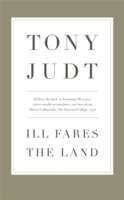Ill Fares the Land

Editorial Allen Lane
Fecha de edición marzo 2010
Idioma inglés
EAN 9781846143595
256 páginas
Libro
encuadernado en tapa dura
Resumen del libro
'Ill fares the land, to hastening ills a prey, Where wealth accumulates, and men decay' - Oliver Goldsmith. Something has gone profoundly amiss in our public affairs over the past thirty years. In the West, we are wealthy and secure enough to allow ourselves to drift very far off course before anything has to be done.
But we have forgotten how to think about the life we live together: its goals and purposes. Not only are we post-ideological; we have become post-ethical. When we ask ourselves whether a particular policy objective should be pursued - universal healthcare or investment in public transportation - we know only how to inquire about its efficiency: its profitability or cost, its impact upon growth and the National Product, its implications for taxation.
We have lost touch with the old questions that have defined politics since the Greeks: is it good? Is it fair? Is it just? Is it right? Will it help bring about a better society? A better world? The US and UK today are more unequal - in incomes, wealth, health, education, life chances - than at any time since 1914. Is this desirable? Is it prudent?Those used to be the political questions, even if they invited no easy answers. Until we have learned - or re-learned - how to pose them, we shall go on as before.
Can we go on 'like this'? Yes. Should we? No. If we are to replace fear with confidence then we need a different story to tell, about state and society alike: a story that carries moral and political conviction.
Biografía del autor
x{0026}lt;P x{0026}lt;B Tony Judt x{0026}lt;/B (Londres, 1948-Nueva York, 2010) realizó sus estudios en el King's College de Cambridge y en la École Normale Supérieure de París. Impartió clases en las universidades de Cambridge, Oxford, Berkeley y Nueva York, y en esta última ocupó la cátedra de Estudios Europeos, que él mismo fundó en 1995, y fue director del Remarque Institute.Entre sus publicaciones cabe destacar x{0026}lt;I El peso de la responsabilidadx{0026}lt;/I (Taurus, 2014), x{0026}lt;I ¿Una gran ilusión?x{0026}lt;/I (Taurus, 2013), x{0026}lt;I Pensar el siglo XXx{0026}lt;/I (Taurus, 2012), x{0026}lt;I El refugio de la memoriax{0026}lt;/I (Taurus, 2011), x{0026}lt;I Algo va malx{0026}lt;/I (Taurus, 2010), x{0026}lt;I Sobre el olvidado siglo XX x{0026}lt;/I (Taurus, 2008), x{0026}lt;I Pasado imperfectox{0026}lt;/I (Taurus, 2007), x{0026}lt;I Postguerrax{0026}lt;/I (Taurus, 2006), considerado uno de los diez mejores libros de 2005 por la x{0026}lt;I New York Times Book Reviewx{0026}lt;/I , galardonadocon el Premio Council on Foreign Relations Arthur Ross y finalista del premio Pulitzer, y x{0026}lt;I Cuando los hechos cambianx{0026}lt;/I (Taurus, 2015). Judt colaboró en diferentes medios de Europa y Estados Unidos, como x{0026}lt;I The New York Review of Booksx{0026}lt;/I , el x{0026}lt;I Times Literary Supplementx{0026}lt;/I o x{0026}lt;I The New York Timesx{0026}lt;/I . En 2007 recibió el Premio Hannah Arendt, y en 2009 el Orwell Prize for Lifetime Achievement. Falleció en agosto de 2010 a causa de una enfermedad degenerativa.x{0026}lt;/P








